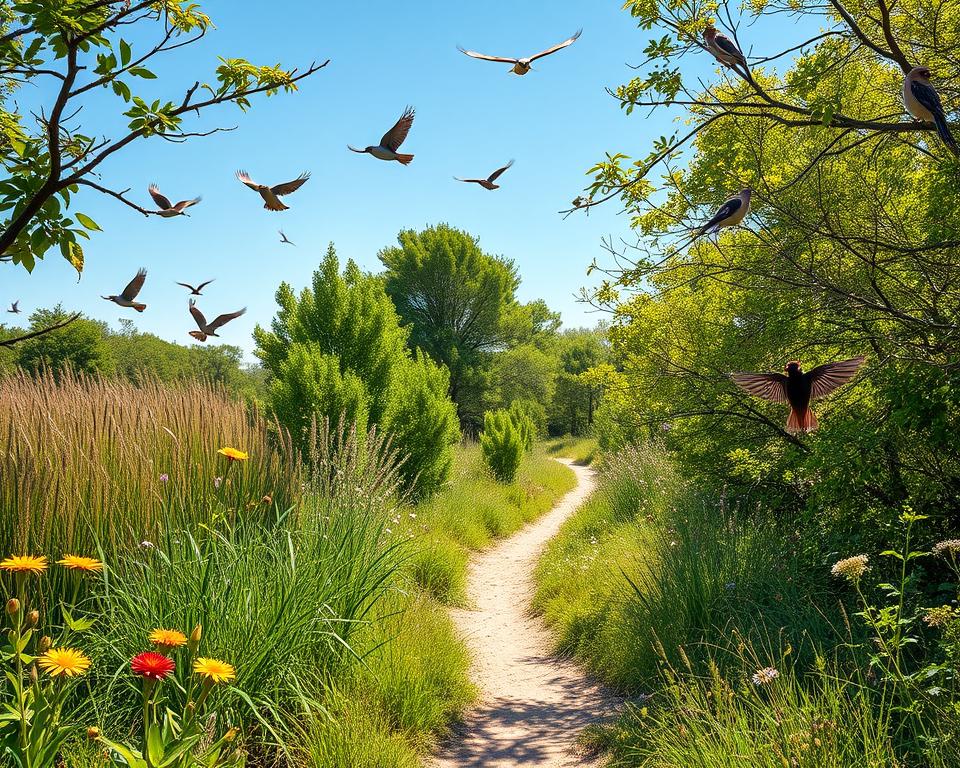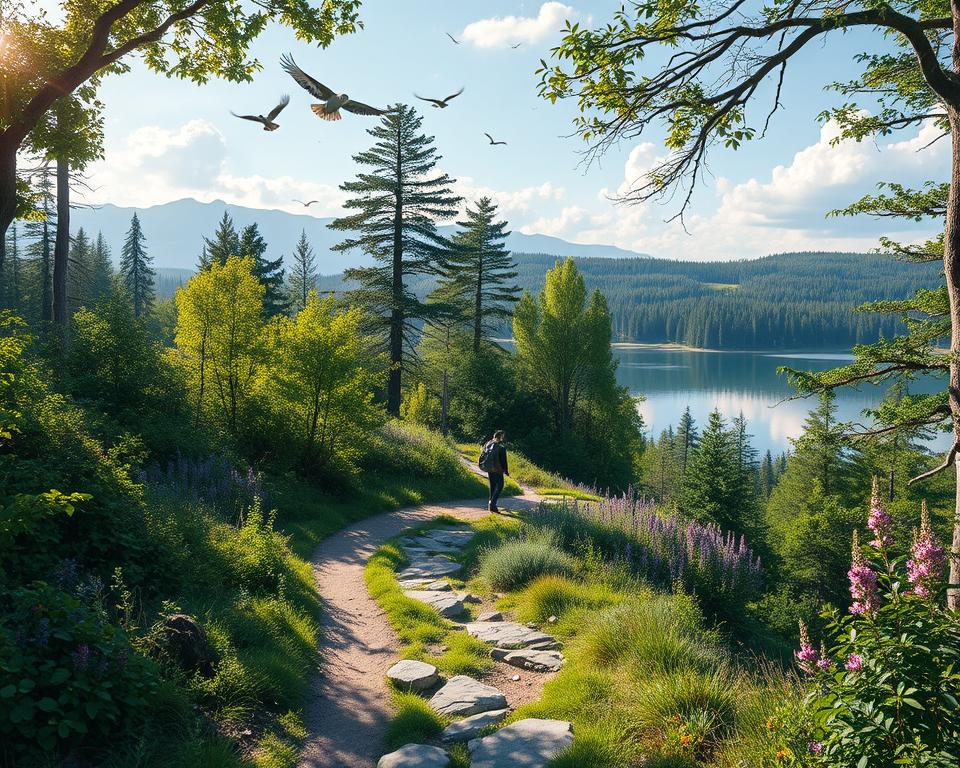Birdwatching, or birding, is loved by many Americans. Since the pandemic in 2020, more people are getting into birdwatching hikes. The increase in bird-identification app downloads and birding gear sales shows this trend. America’s diverse ecosystems provide plenty of chances for seeing wildlife and exploring nature. You can find these opportunities in city parks, national parks, and along the coast.
Birding does more than let us see amazing birds. It connects us to nature in deep ways. It shows us the changing seasons and lets us feel part of different places. For a lot of people, birdwatching is more than just a hobby. It’s a way to discover the beauty of our natural surroundings.
Shenandoah National Park, Virginia
Shenandoah National Park in Virginia is a must-visit for bird lovers. Located in the Blue Ridge Mountains, it boasts a wide range of bird habitats. With lush forests and scenic meadows, it’s perfect for spotting different bird species. The park is home to around 200 bird species throughout the year. Each season offers unique sightings. This makes it a prime location for birdwatching.
Why It’s a Top Spot
The park sits on the Blue Ridge Mountains crest, creating a perfect environment for birds. It’s home to various species, including neotropical migratory birds. During migrations, Shenandoah is bustling with birdwatchers eager to see rare species. About 30 bird species live in the park year-round. This includes colorful warblers. Big Meadows, for instance, offers birdwatching experiences that are hard to find elsewhere.
Best Trails to Explore
Shenandoah spans nearly 75 miles of the Virginia Bird & Wildlife Trail. It’s a haven for birdwatchers with its 516 miles of trails. Notable spots include Hawksbill Mountain, standing at 4,051 feet, where the views are as stunning as the birdwatching. For more of a challenge, Old Rag Mountain offers a thrilling climb. Despite its risks, it’s one of the park’s most exhilarating hikes. With its extensive trail system, Shenandoah promises unforgettable wildlife encounters.
Harlingen, Texas
Harlingen, Texas, is a top spot for birdwatching fans. The Rio Grande Valley Birding Festival every fall is a big event. It attracts bird lovers globally. Now in its 26th year in 2019, the festival is known for its diverse Texas endemic birds.

What makes Harlingen birdwatching special is its variety of birds. The Rio Grande Valley has recorded over 500 bird species. It’s a key area for bird migrations in North America. Bird enthusiasts enjoy unique species like green jays and chachalacas during these times.
Harlingen has many famous birding places on the Great Texas Birding Trail. The Arroyo Colorado Hike & Bike Trail and Harlingen City Lake are popular spots. The Harlingen Thicket Nature Park and Hugh Ramsey Nature Park offer more birdwatching adventures. About an hour east, the Laguna Atascosa National Wildlife Refuge covers 97,007 acres. It’s home to wildlife and over 130 butterfly species.
The World Birding Center in Harlingen is a place you must see. It spans 10,000 acres across three counties. Visitors can see over 500 bird species here. The Estero Llano Grande State Park in Weslaco covers 176 acres. It attracts a wide range of South Texas wildlife.
Harlingen combines the beauty of nature with birdwatching. It’s an exciting place for anyone who wants to see Texas endemic birds and the unique birds of the Rio Grande Valley.
New York City, New York
New York City, despite its busy streets, is a major spot for birdwatching. It has over 1700 parks, including famous ones like Brooklyn’s Prospect Park and Manhattan’s Central Park. These places are key for over 200 kinds of migratory birds flying through the Atlantic Flyway.
Birding in the Urban Jungle
The birdwatching scene in NYC is a prime example of how cities can support nature. With various parks to explore, both experienced birders and beginners can enjoy watching birds. Central Park is known for its 230 bird species, with The Ramble and North Woods being favorite places to see them.
In northern Manhattan, places like Inwood Hill Park are special for bird lovers. Here, you can see belted kingfishers and even bald eagles. Highbridge Park and Fort Tryon Park are also great for spotting woodpeckers and hawks during migration seasons.
Top Birdwatching Locations
Some top birding spots in NYC include Van Cortlandt Park in Bronx and Pelham Bay Park. Van Cortlandt Park, with its 1,146 acres, houses about 230 bird types. Pelham Bay Park, the city’s largest, lets birdwatchers see great horned owls and northern saw-whet owls.
Marine Park in Brooklyn is a big place with over 300 bird species, such as ospreys and Canada geese. Prospect Park is special too, with its Audubon Center showcasing over 200 bird types.
The New York State Birding Trail starts in NYC and stretches throughout the state. It encourages birdwatching across various lands. This trail began at Staten Island’s Mount Loretto Unique Area.
NYC Audubon highlights over 100 great places for birdwatching across the five boroughs. Thanks to groups like the Feminist Bird Club, urban birdwatching has become more popular and accessible for everyone.
Are Coastal Hiking Trails in Maine Good for Birdwatching?
Coastal hiking trails in Maine offer stunning views and diverse habitats, making them excellent for birdwatching. From migrating seabirds to resident species, enthusiasts can spot a variety of avian life. To enhance your experience, explore online resources to discover the best coastal hikes in maine that cater to birdwatchers.
Toledo, Ohio
Toledo, Ohio might not be your first thought for birdwatching. Yet, for those who know, it’s a hidden gem in May. The city and its surroundings burst with birds, drawing over 90,000 birders yearly to the Biggest Week in American Birding. The key spot is the southern shores of Lake Erie. Here, hundreds of bird species make their northward journey every spring.
At the heart of Toledo’s birdwatching scene is Magee Marsh Wildlife Area. It’s about nine miles north of Oak Harbor. Magee Marsh is famous for its large numbers of North American warblers in spring. Bird fans get an up-close look at these amazing birds here, making it a top spot during the birding week. The Black Swamp Bird Observatory ensures these places stay safe and beautiful for birds.
Maumee Bay State Park is also nearby, offering varied birding spots. You can see gulls and waterfowl at the beach, raptors in fields during winter, and songbirds in the forests. Pearson Metropark and Howard Marsh Metropark add more to Toledo’s birding charm. Each provides essential habitats, from waterfowl at Howard Marsh to woods for migrating birds at Pearson.
Toledo’s birding doesn’t stop there. Places like Cullen Park, with its long causeway trail, and the peaceful Ottawa National Wildlife Refuge are perfect for birdwatchers. Metzger Marsh Wildlife Area also offers unique birding experiences. Plus, the Maumee River Rapids and Maumee State Forest are great habitats. All these make Toledo a top birdwatching destination.

